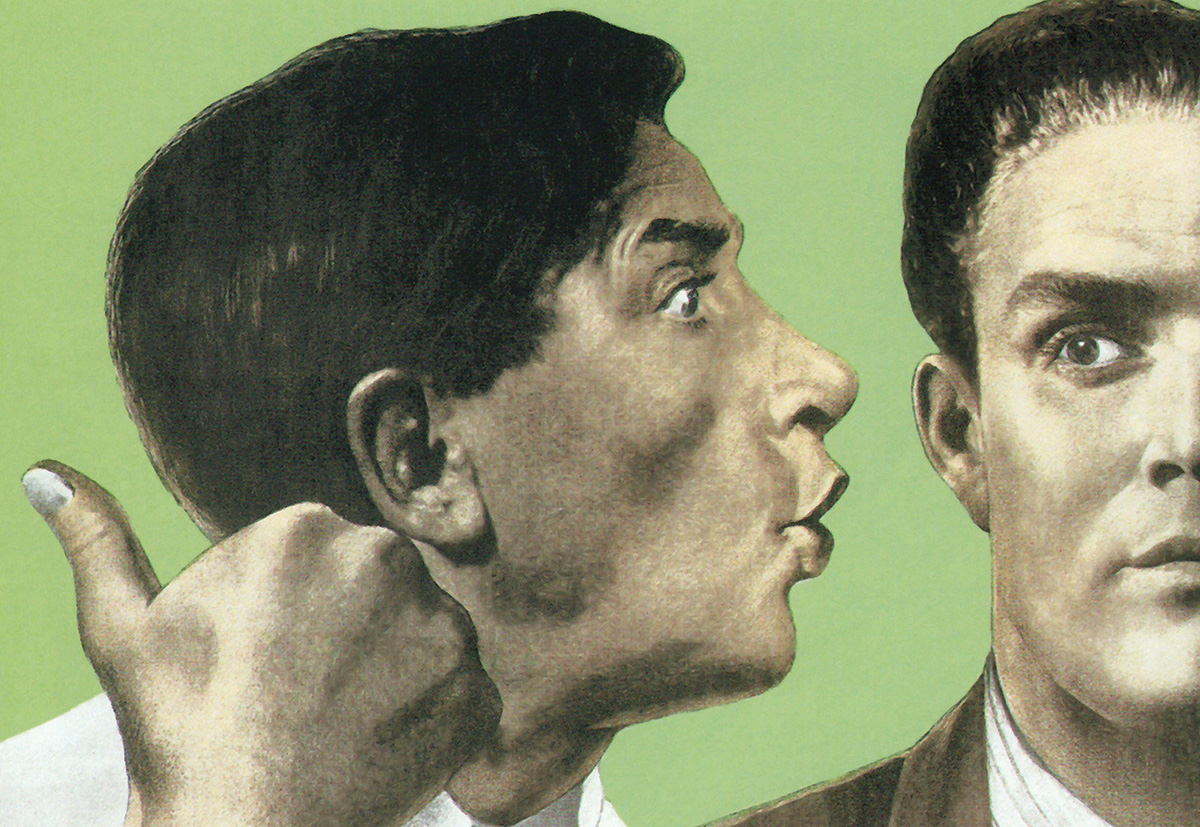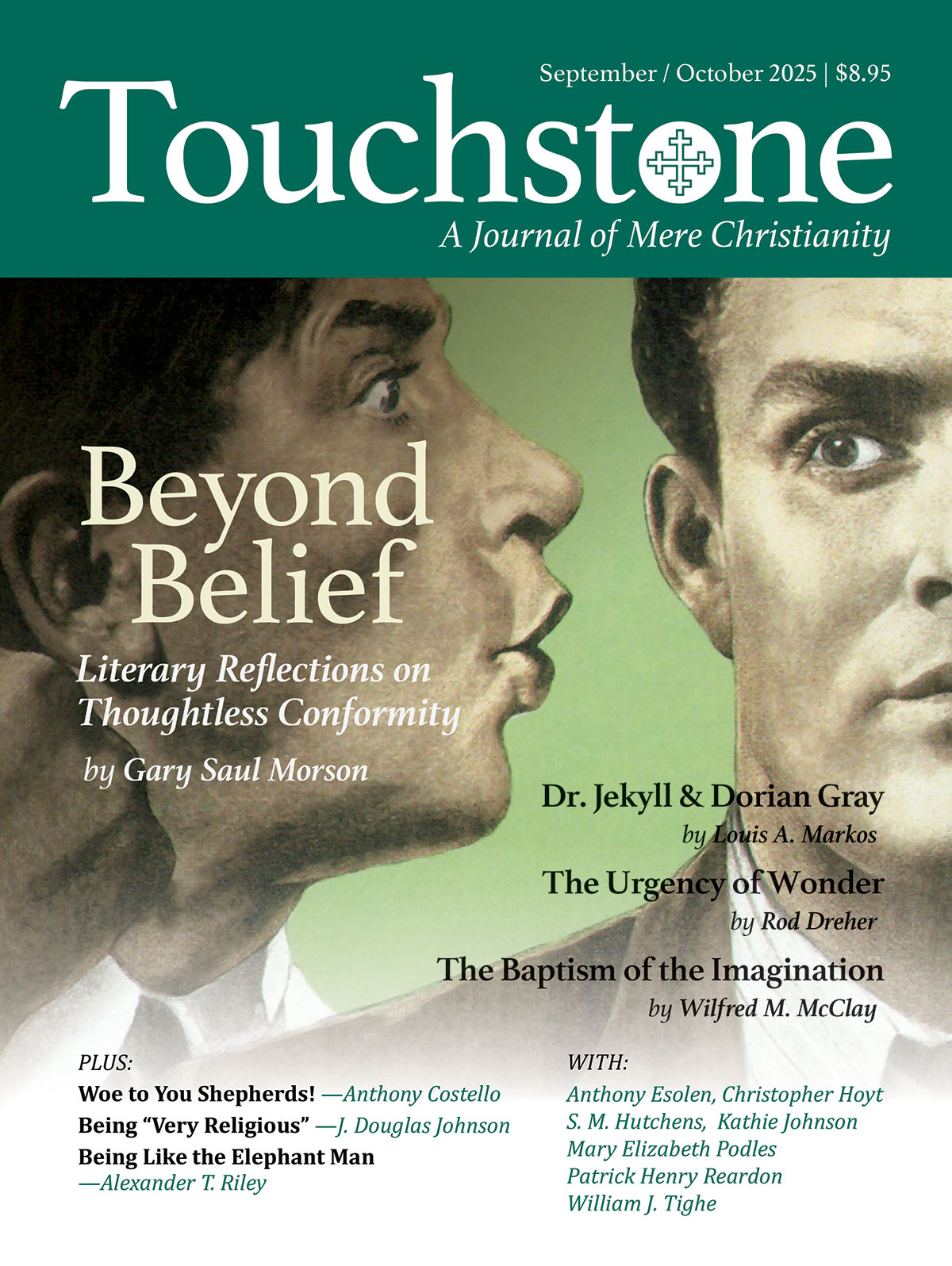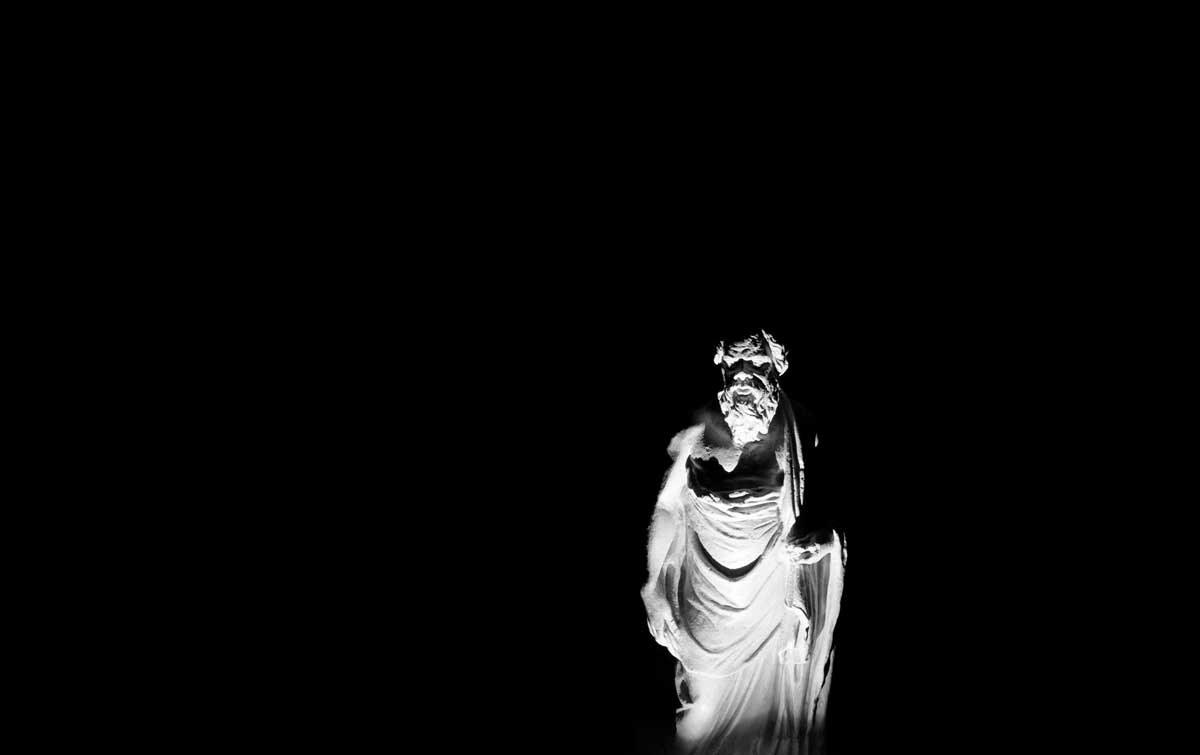Beyond Belief
Literary Reflections on Thoughtless Conformity
What shall a man give in exchange for his soul? —Mark 8:37
Sometimes I wonder whether my colleagues believe what they profess. Can they really think that what Hamas did on October 7, 2023, was something to celebrate? Do they actually consider their fellow citizens who vote differently to be Nazis? And what goes through their minds when evidence disproves assertions they have deemed scientific or otherwise irrefutable? When it turned out that the Covid-19 vaccine did not prevent infection or transmission as claimed, was there a moment in which they realized that those they had condemned as “anti-science” had been right? If not, how did they manage to change their minds without acknowledging they had done so?
These and similar questions about the nature of belief, which have become especially pressing in recent years, have perplexed me for decades. In the 1980s, I witnessed an older professor unsure how to vote at a faculty meeting. Raising his hand halfway, he cautiously looked around to see how his younger colleagues were voting. Seeing that their hands were in their laps, he slowly lowered his, as if he had only raised it to scratch his nose. When they suddenly raised theirs, he did the same, as if he shared their conviction. This cowardly behavior saddened me, because the older professor was far more eminent than his younger colleagues could ever hope to be, but he evidently could not bear to forfeit their good opinion. He sided with them, but what did he really believe?
Hoping to find out, I asked him why he had voted as he did. He offered what seemed like well-considered reasons. He appeared to believe them. It was as if his anxiety to ascertain and copy his younger colleagues had been expunged from his memory. But is that really what belief means? Evidently the feeling of belief can mislead. His reasons were an afterthought, a mere rationalization. What he really seemed to believe was that he should profess whatever was prescribed opinion. Having ascertained that opinion, he seemed to accept it on its merits.
My mind was in a whirl. I recalled Benjamin Franklin’s sardonic observation that man is a rational being because he can always rationalize whatever he wants to do. And then, I would add, he can believe his rationalizations. But is that really believing?
People of faith have long known that belief is not a simple concept. A good deal of Pascal’s Pensées is devoted to the topic. When the father of the boy possessed by an evil spirit implores Jesus, “O Lord, I believe; help Thou my unbelief” (Mark 9:24), what exactly did he mean?
The Package
About a decade after questioning the cowardly professor, when I spent a year in Stanford at the Center for Advanced Studies in the Behavioral Sciences, I happened to witness two professors waiting for an elevator. To make conversation, one voiced an opinion on some political question to see if the other agreed. When she did, they chattered away on a dozen other topics with perfect assurance that they agreed on those, too. Evidently, their beliefs came as a package. Subsequently I noticed this way of thinking many times, as I imagine many of my readers have.
The process works something like this: a person first chooses the group with whom he wishes to identify and then adopts its opinions. He believes as strongly in gun control, let us say, as he does in supporting Planned Parenthood, defunding the police, and banning fossil fuels. It is evident that no arguments or evidence can shake his opinions on any of these topics because arguments or evidence had nothing to do with why they were adopted.
To be sure, a person who thinks this way can cite facts and reasons to justify his opinion, but they have been acquired in the same way as the opinion itself. They are the same reasons others in the group have learned to give. I used to find it eerie to hear repeatedly the same arguments expressed in the same phrases, as if I were listening to a recording rather than to highly educated people who imagined that, unlike their intellectual inferiors, they had arrived at opinions rationally and would change them as evidence warranted. I thought of Jonathan Swift’s observation that no one was ever talked out of an opinion he was not first talked into.
In a sense, a person who holds opinions this way sincerely believes them. He may be genuinely angry when other beliefs are expressed or lose sleep when an election goes the wrong way. And yet, if to believe means to accept a view because one has really thought about it, something other than belief is involved when an opinion is adopted as part of a package. We lack a term for this state of mind. We have to make do with “belief,” while realizing that the word is one term designating many different things.
Tolstoy & Inauthentic Belief
Nineteenth-century Russian writers addressed “the question of belief” with great subtlety. In a culture where philosophy touched people personally and where abstractions often felt more concrete than immediate surroundings, convictions meant a great deal. In his autobiography My Past and Thoughts, Alexander Herzen recalled that “people who loved each other avoided each other for weeks at a time because they disagreed about the definition of [Hegel’s] ‘all-embracing spirit,’ or had taken as a personal affront an opinion on ‘the absolute personality and its existence in itself.’” Pierre in War and Peace, Levin in Anna Karenina, Bazarov in Fathers and Children, and Ivan in The Brothers Karamazov all seek “the meaning of life and death” as ardently as one might obsessively pursue a lover; in Dostoevsky’s The Possessed, Shatov explains that he “feels ideas.” Because these heroes value the truth above all, they change their minds frequently and do not care if they differ from others. They would never adopt beliefs as a package or shield themselves from counterevidence.
These characters, who hold their beliefs authentically, are contrasted with those who do not. Russian novels portray many ways to hold beliefs inauthentically. Consider Anna Karenina’s brother Stiva, who
had not chosen his political opinions or his views; these political opinions and views had come to him of themselves, just as he did not choose the shapes of his hat and coat, but simply took those that were in style. And for him, living in a certain social environment, where a desire for some sort of mental activity was part of maturity, to hold views was just as indispensable as to have a hat.
Having chosen the group with which they wish to identify, people like Stiva adopt all their opinions. Somehow they then experience those opinions as their own. Stiva
took and read a liberal paper . . . and in spite of the fact that science, art, and politics had no special interest for him, he firmly held those views on all these subjects which were held by the majority and by his paper, and changed them only when the majority changed them—or, more strictly speaking, they seemed to change of themselves within him.
What exactly does it mean to “firmly hold” opinions one has not really considered?
As liberal opinion shifts, Stiva’s shifts along with it. He can always agree with his paper, even when it contradicts what it said before, and he never finds himself saying, as some people do today, that his paper has moved in a direction he cannot accept. Such a judgment requires agency, the considered evaluation of ideas, but for Stiva no agency is involved. His opinions change, but he does not change them. Wherever his paper goes, he follows, and so his views “seemed to change of themselves within him.” Stiva thinks thoughtlessly.
Stiva’s friend Levin could not be more different. He is always changing his mind on one issue or another as experience disconfirms earlier views, and so his opinions never line up with those of any camp. For Tolstoy, that is the sign of authentic thinking. If someone’s opinions always coincide with those of his chosen group, and if they evolve in the same way, you can be confident that no real thought is involved. Tolstoy’s fiction focuses less on what people believe than on how they believe.
Levin has been trying to increase the productivity of his estate by liberal opinion’s prescribed method: adopting machinery, seeds, and work practices from England. He has discovered that, for some reason, what works in England fails in Russia. When he visits his friend Sviazhsky, he discovers from Sviazhsky’s wife that they have hired a German accountant to calculate the return on their investment and learned that it is negative! This disappointing result leads to no reflection or change. Sviazhsky still insists on the same liberal solution, even though it costs him money, and he professes as firmly as before all other liberal ideas, regardless of their results in practice. Levin tries to change Sviazhsky’s mind, but his friend is always ready with prescribed replies or an adept change of subject.
A key function of partisan papers is to tell followers what to say when others cite counterevidence. In this and other chapters, Tolstoy exemplifies how discussions go when someone “firmly holds” beliefs no counterevidence can shake—something we witness on TV opinion shows and in the academy all the time. Universities are supposed to offer especially rigorous research in discovering the truth—that is one reason society supports them—but when contrary views or evidence are denounced before they have been seriously examined, it is not truth but orthodoxy that matters. Real science or scholarship is now restricted to areas that remain untouched by politics or social controversy. If science is “the belief in the ignorance of experts,” as Richard Feynman famously stated, then there are whole domains where experts claiming the authority of science actually betray it. When Dr. Fauci maintained that questioning him is questioning science, I could almost hear Feynman’s ghost laughing.
One of Sviazhsky’s guests, described simply as a “reactionary landowner” (a right-wing extremist, in today’s parlance), expresses views that proper liberal folk laugh at. Inviting Levin to share in the mirth, “Sviazhsky looked with smiling eyes at Levin, and even made a faint gesture of irony to him,” but Levin actually considers the landowner’s arguments. It’s a dangerous thing to do, because one might wind up changing one’s mind and disagreeing with one’s paper and one’s friends! Listening carefully, “Levin did not think the landowner’s words absurd, he understood him better than he did Sviazhsky”:
The landowner unmistakably spoke his own individual thought—a thing that rarely happens—and a thought to which he had been brought not by a desire of finding some exercise for an idle brain, but a thought which had grown up out of the conditions of his life, which he had brooded over in the solitude of his village, and considered in every aspect.
Even when Levin disagrees with the landowner, he learns something. Since the landowner’s views reflect his considered experience, Levin can, so to speak, graft that experience on to his own and so broaden it. To be sure, Sviazhsky’s views on agriculture also reflect experience—but not the experience of farming. They reflect the experience of being a genial host and a socially adept enlightened liberal.
In Tolstoy’s fiction, inauthentic beliefs lead to shallow lives. The eponymous hero of “The Death of Ivan Ilych” discovers that, precisely because he has always perfectly fit expected roles, done just what he was supposed to, and thought exactly what respectable liberal professionals thought—he has been what Tolstoy calls a conformist “virtuoso”—he does not know who he is or what he really believes. When he falls mortally ill, he realizes to his horror that someone else will do his job and fill his roles, but that he, his unique self, will die without having really lived. As Tolstoy wrote in his diaries, “such lives are as if they had never been.”
Dostoevsky & Intellectual Flunkeyism
No less concerned with the question of belief, Dostoevsky focused on the extreme conformity of the radical intelligentsia. He describes Lebeziatnikov, an intellectual in Crime and Punishment, as one of the “numerous and varied legion of dullards, of half-animate abortions, conceited, half-educated coxcombs, who attach themselves to the idea most in fashion only to vulgarize it . . . however sincerely.” Having learned all the most advanced opinions, this smug dullard advises his benefactor, who is about to be married, to encourage his bride to take a lover a week after the wedding. A materialist, Lebeziatnikov, like all the leading members of the intelligentsia, denies the existence of free will. No one is responsible for his actions, he explains, because “it all depends on the [social] environment. It’s all the environment and man himself is nothing. . . . We have gone further in our convictions. We reject more.” In The Possessed, a radical whose wife actually does take a lover finds that, in spite of his convictions, he can’t help losing his temper. He is ashamed of himself ever after.
At the beginning of The Brothers Karamazov, the narrator wonders why a wealthy beauty like Adelaida Ivanovna could have married such a nasty weakling as Fyodor Pavlovich. He compares Adelaida Ivanovna to
a woman of the last, “romantic” generation . . . who after some years of enigmatic love for a gentleman, whom she might easily have married at any moment, invented insuperable obstacles to their union, and ended by throwing herself one stormy night into a rather deep and rapid river from a high bank, almost a precipice, and so perished, entirely to satisfy her own caprice, and to be like Shakespeare’s Ophelia.
She died for her beliefs, but did she really believe them?
In much the same way, the narrator continues, Adelaida Ivanovna may have acted according to the prescribed beliefs of her own generation. Her radical convictions were not really hers but “an echo of other people’s ideas.” What ideas? The ones everyone of her circle held: in marrying Fyodor Pavlovich, the narrator surmises, she must have
wanted to assert feminine independence, to go against social convention, against the despotism of her family and birth, and an obliging imagination persuaded her, if only briefly, that Fyodor Pavlovich, in spite of his rank as a sponger, nevertheless was one of the boldest and most ironical people of that epoch in transition to universal betterment, when he was just a nasty buffoon, and nothing more.
I have italicized the received phrases here because for Dostoevsky’s first readers they came with implicit quotation marks. Adelaida Ivanovna thinks in canned phrases. Dostoevsky called such thinking “wearing a uniform.”
In The Possessed, Dostoevsky shows how such thinking can be far more dangerous than we usually suppose. This novel has become famous as the only significant work of the nineteenth century that not only predicts what we have come to call totalitarianism but also describes it in detail. Whatever did not happen in the USSR took place during the Chinese Cultural Revolution or in the killing fields of the Khmer Rouge. Critics of this novel often overlook that it is not the radical leader Pyotr Stepanovich, who knows just what he is doing, at whom the author directs special scorn but the conformist wannabes who follow him. Still more worthy of contempt are the liberals who do not accept radical beliefs but can’t imagine going against advanced opinion.
Pyotr Stepanovich perfectly understands the psychology of liberals and knows he can count on them doing anything he wants. “I could make them go through fire,” he tells the novel’s central character, Stavrogin, “one has only to din it into them that they are not advanced enough.” Supposedly rejecting all authority, they are “ashamed to have an opinion of their own. That is a force! And whose work is it, whose precious achievement is it, that not one idea of their own is left in their heads! They think originality a disgrace.” They favor the guillotine, explains one character, because it is easier to cut off heads than to think through an idea. Shatov calls their mindset “flunkeyism of thought.”
The Spectrum of Awareness
How many followers of Russian terrorists and totalitarians, who did not conceal their plans for killing millions once they gained power, really knew what they were supporting? For that matter, how many North American supporters of Hamas actually regard sexually violating, mutilating, and murdering people, while shouting with glee at the chance to do so and photographing the cruelty, as something to praise? The answer is that there is always a spectrum of awareness. There are many who don’t really know what they are supporting, Pyotr Stepanovich explains; they work for “the cause” without being aware of doing so.
“I’ve reckoned them all up,” Pyotr Stepanovich explains. “A teacher who laughs with children at their God . . . is on our side. . . . The prosecutor who trembles at a trial for fear he should not seem advanced enough is ours, ours. Among officials and literary men, we have lots, lots, and they don’t know it themselves.” It is only necessary to foment fresh kinds of outrage and new vocabulary for expressing it. “Do you know how many we will catch by little, ready-made ideas?” Pyotr Stepanovich asks. “Every scurvy group will be of use. Out of these groups I’ll pick you out fellows so keen that they’ll not shrink from shooting, and be grateful for the honor of a job, too.”
When at a meeting of the radicals, many endorse mass revolutionary killing (“a hundred million heads”), a major, who has stumbled into the gathering accidentally, replies: “I confess I am rather in favor of a more humane policy . . . but as all are on the other side, I go with all the rest.” It is perhaps the most chilling line in the novel. Anyone who wonders how our traditionally liberal society could be yielding so readily to antisemitism and quasi-Marxist ideologies should read this novel. A prediction, after all, can come true more than once.
Magic Words
In her remarkable memoir Hope Against Hope, Nadezhda Mandelstam wonders why, in the first decade after the Bolshevik seizure of power, so many went along with violence they knew to be wrong. “Why is it so easy to turn young people into killers? Why do they look on human life with such frivolity?” she asks. And it wasn’t just young people: older people cheered them on and demanded ever more killings. We resembled dogs, she explains, and “the whole pack licked the hunter’s hand, squealing incomprehensibly. The head-hunting mentality spread like a plague. I even had a slight bout of it myself,” she confesses.
Even people who should have known better, like Nadezhda’s husband, the poet Osip Mandelstam, found it hard to go against the current of opinion:
He really was in a state of confusion: it is not so simple to go against everybody and against the times. To some degree . . . we all had the temptation to rush after everyone, to join the crowd that knew where it was going. The power of the “general will” is enormous—to rush against it is much harder than people think.
Sometimes Mandelstam clung to his outmoded views about morality, art, and God. At such moments, he would reject the pull to join the revaluation of all values and abolish the old commandments, especially “Thou shalt not kill.” In an unpublished article on the composer Scriabin, “he outlined his views on Christian art, giving expression to what he really believed.” But at other times Mandelstam, despite his better judgment, succumbed to “an occasional desire . . . to come to terms with reality and make excuses for it . . . as though he were under hypnosis. At such moments he would say that he wanted to be with everybody else, and that he feared the revolution might pass him by.” He was not alone. Nadezhda explains in her memoir’s most quoted passage:
My brother Yevgeny Yakovlevich used to say that the decisive part in the subjugation of the intelligentsia was played not by terror and bribery (though, God knows, there was enough of both), but by the word “Revolution,” which none of them could bear to give up. It is a word to which whole nations have succumbed, and its force was such that one wonders why our rulers still needed prisons and capital punishment.
It is a good sign that people are under similar “hypnosis” when “Revolution” or other words exert such magical power. How many today succumb to the spell of “social justice”? Call torture social justice, and advanced people will favor it.
Singing in Unison
When Communism was still attractive to post-war Polish intellectuals, Czeslaw Milosz described the pull it had on writers, who knew that if they produced works belonging to another age, their efforts, however talented, would not matter. Such a writer “does not surrender to this ‘must’ merely because he fears for his own skin. He fears for something much more precious—the significance of his work.” Something similar happens to all intellectuals. Their sense of superiority derives from their holding advanced ideas. They tremble at “not seeming advanced enough.” Like writers, they fear to sacrifice the “significance of their work” and, indeed, of their whole lives.
What really matters, Milosz explains, is “the intellectual’s feeling of belonging.” His defining “characteristic is his fear of thinking for himself.” For this reason, as well as to prosper, he must root out all the old ways of thinking. Milosz describes a phenomenon with which university people are all too familiar, the always incomplete process of teaching oneself to say the right things (in the right words), and avoid saying the wrong ones, so that one never makes a slip entailing ostracism or worse. Of course, the best way to do this is to get oneself actually to share the prescribed views. Milosz describes how
after long acquaintance with his role, a man grows into it so closely that he can no longer differentiate his true self from the self he simulates, so that even the most intimate of individuals speak to each other in Party slogans. To identify self with the role one is obliged to play . . . permits a relaxation of one’s vigilance. Proper reflexes at the proper time become truly automatic. . . .
Acting on such a scale has not occurred often in the history of the human race.
Perhaps not to such a scale, but I have attended dinner parties where friends and colleagues speak to each other in social justice slogans. Do they really mean them? Or does that question not even occur to them?
In Mikhail Bulgakov’s comic novel The Master and Margarita, the devil and his retinue visit Stalinist Russia to play practical jokes on conformist citizens. Unlike the slogans those citizens voice, the jokes targeting conformism are truly imaginative and therefore funny. The manager of one office, who regards it as his duty to make sure that people have no individual interests, fills their time with clubs and other activities done together. “Retired choirmaster” Korovyov, who is really a demon, persuades him to organize a singing club. After getting everyone to sing in unison—an obvious symbol of what conformist Soviets do anyway—he makes them unable to stop. Witnesses “were struck by the fact that although the choristers were scattered throughout different rooms, they sang very harmoniously, as if the whole chorus were standing in one place with its eyes glued to an invisible conductor.”
Bulgakov’s readers would have known that Stalin was routinely praised as the great “coryphaeus,” the term for the leader of the chorus in Greek drama. In another office, Korovyov replaces a bureaucrat with (literally) an empty suit, who continues to sign papers in the same way; when the bureaucrat returns, he approves everything the suit has done. Are perfect conformists really people? Do they have souls?
Courage
In life and literature, one may begin to discover one’s soul the first time one escapes the chorus to sing one’s own song. In Vasily Grossman’s novel Life and Fate, dedicated Communist Krymov, who has always merged his will with the Party’s and trained himself to think only approved thoughts, finds himself asking skeptical questions. “Questions like these were best forgotten. But tonight Krymov was unable to forget them.”
Why, he asks himself, did he lack the strength to say he did not believe the absurd accusation that Bukharin was a saboteur and assassin, but instead raised his hand and signed? “What am I trying to say?” he asks himself. “That I am a man with two consciences? Or that I am two men, each with his own conscience?” The most important difference between socialist realist and dissident fiction is that the former describes how such moments of weakness are at last overcome and the latter how they lead to the discovery of a self capable of taking responsibility for what it thinks and does.
Breaking free from the chorus requires courage. In The Master and Margarita, part of which is set in ancient Jerusalem, Pontius Pilate asks himself how he could have had the courage to fight hordes of German barbarians but lacked the courage to resist pressure and free Yeshua (Jesus). Russia’s most recent Nobel prize winner, Svetlana Alexievich, posed the same question: “Courage in war and courage in thought are two different things,” she reflected. “I used to think they were the same.” One way the two kinds of courage differ is that in battle one acts along with others, but in thinking and in doing what is right one acts by oneself. When fighting a battle, one’s life is at stake; when thinking and acting alone, it is one’s soul.
Conscience
Vorotyntsev, the hero of Aleksandr Solzhenitsyn’s November 1916, finds himself at an informal gathering of the Kadets (Constitutional Democrats), the Russian liberals. Proceedings closely resemble the gathering of radicals in The Possessed, except that the opinions recited are those of a different party. Everyone strives to show how much he adheres to accepted positions. It’s not really an exchange of views, because only one view is expressed in various ways. The meeting recalls a scene in War and Peace just after the French invasion, when the tsar assembles the Moscow nobles to pledge their loyalty and resources. Tolstoy’s hero, Pierre, dreams that aristocrats will seize the opportunity to ask probing questions and initiate something like a parliamentary government, but they instead fervently echo whatever the tsar says. Some shout, “I agree!” Tolstoy acidly remarks, whereas others, to be different, exclaim, “I am of the same opinion!”
For some reason, Vorotyntsev reflects, these liberals all evidently regard it as “imperative . . . to meet and hear all over again what they collectively knew. They were all overpoweringly certain they were right, yet they needed these exchanges to reinforce their certainty.” What sort of certainty is that?
Although Vorotyntsev knows from his military experience that what the liberals are saying about Russian soldiers is untrue, he feels an almost irresistible pull to go along. “What is it that always forces us to adopt the general tone?” he wonders. “The whirl left Vorotyntsev dazed like a ram staring at a new gate. He tried not to show even by his expression how much he disagreed.” It was like a magic spell: “if you tried to say something yourself, however clear your thoughts were, you looked ridiculous.” Sensing this “bewitchment,” as Solzhenitsyn also calls it, Vorotyntsev finds himself echoing falsehoods. “He had lied, prevaricated, betrayed his beliefs. Why couldn’t he manage it? Say this is my opinion. . . . Why was he so feeble?”
As Bulgakov’s Pilate wonders how he could be such a coward when he had been brave facing German soldiers, Vorotyntsev asks how he could have had the courage, as a mere colonel, to attack incompetent generals, while “here he was afraid. . . . It was like a contagious disease.” As if against his will, Vorotyntsev “gave ground, held his peace. Not because he was wrong, but out of fear of saying something reactionary.”
Defying the generals, Vorotyntsev was also acting alone, so this time that is not the difference. What is it? He knew how to answer the Kadets, he reflects, but “still he couldn’t bring himself to say it. He despised himself for it.” It wasn’t fear of taking risks either, but something within, his sense of himself. Shtrum, the hero of Grossman’s Life and Fate, experiences much the same bewitchment. Both writers recognize that unless one understands how this pressure to conform works, one will not grasp why, in political life, counterevidence fails to persuade people, or why even those who know better can’t bring themselves to defy consensus.
At last Vorotyntsev finds the strength to resist. “A jolt. He was free. Free from the unbearable bewitchment. . . . He spoke loudly, challengingly addressing the whole gathering.” Solzhenitsyn is describing how a person finds the courage to follow his conscience.
Conscience, understood as an individual’s inner moral judge, was not a Soviet concept. Nadezhda Mandelstam explains that the word “conscience” came to sound archaic and almost entirely disappeared, replaced by “consciousness” (as in “class consciousness”). Moral judgment could not be individual; it had to be collective. It belonged entirely to the Party. In this materialist society, conscience disappeared along with the soul.
That is why the recovery of conscience and the courage to act according to it so often assumed religious form. It is a noteworthy fact that three of the four greatest literary works written in the officially atheist Soviet Union were all avowedly Christian: The Gulag Archipelago, The Master and Margarita, and Doctor Zhivago. The fourth, Life and Fate, written by the Jewish Grossman, also describes the discovery of conscience and absolute values.
Lara, the heroine of Doctor Zhivago, identifies the “root cause of all the evil” around her as “the loss of confidence in the value of one’s own opinion. People imagined that it was out of date to follow their own moral sense, that they must all sing in chorus, and live by other people’s notions, notions that were being crammed down everybody’s throat.” “Living by other people’s notions,” surrendering one’s conscience to prevailing opinion: the twentieth century shows how terrible that can be. Will the twenty-first demonstrate the same thing?
Barefoot on the Ice
As Solzhenitsyn explains, Soviet philosophy drew the logical conclusions from uncompromising atheism that Westerners often soften. If there is nothing beyond the material world, then right and wrong reduce to effectiveness or, in Soviet parlance, “only the result counts.” It followed that refraining from destroying an enemy when possible is itself immoral. Lenin once called for a Bolshevik leader who had refrained from taking maximal advantage from an opportunity to be examined for mental illness.
So long as it was effective, the cruelest policy was not only permitted but mandatory. According to Leninist ethics, compassion is a vice, and that is what Soviet schoolchildren were taught.
Solzhenitsyn had also been taught to profess this view. In Gulag, he describes the moment when he realized he did not really believe it. Once he off-handedly remarked that President Roosevelt’s public prayer was of course hypocritical, and to his surprise a young man with a sensitive Jewish face, Boris Gammerov, demanded to know why he was so sure that a political leader could not sincerely believe in God. Solzhenitsyn was amazed to hear such words from someone born after the Revolution. “I could have replied to him very firmly” with the prescribed answers, he recalls, “but prison had already undermined my certainty, and the principal thing is that some clean, pure feeling does live within us, existing apart from all our convictions. I had not spoken out of conviction but because the idea had been planted in me from outside.” Planted in me from outside: this is Solzhenitsyn’s phrase for sincere but inauthentic belief. He suddenly understood that he did not really believe what he had thought he believed.
But what did he believe? Solzhenitsyn realized he did not know and would have to search for his own deepest convictions. That journey led him to faith. Prisoners’ behavior offered initial insights. If only the result counts, then one should do whatever it takes to survive, and he found that convinced Communists really did not hesitate to sacrifice others. “To survive at any price . . . whoever takes that vow, whoever does not blink before its crimson burst—allows his own misfortune to overshadow both the entire common misfortune and the whole world,” Solzhenitsyn reflected. “This is the great fork in camp life: From this point the roads go to the right and to the left. One of them will rise and the other will descend. If you go to the right—you lose your life; and if you go to the left—you lose your conscience.”
Once Solzhenitsyn sensed his conscience as an inescapable fact, he rejected the official atheist tenet that only the result counts. “But that is a lie!” he decided. After back-breaking labor and terrible punishment, “we [prisoners] have been climbing up to an understanding of life—and from this height it can all be seen so clearly: It is not the result that counts! It is not the result—but the spirit!”
Once you come to that realization, Solzhenitsyn continues, then “imprisonment begins to transform your character in an astonishing way. To transform it in a direction most unexpected to you.” Instead of being certain in your judgment of others, you discover that “an understanding mildness has become the basis of your uncategorical judgments. You have come to realize your own weakness—and you can therefore understand the weakness of others.” That is the essence of the Christian precept to judge not lest ye be judged. And it is also the basis of what Solzhenitsyn calls “genuine friendship.” “Your soul, which formerly was dry, begins to ripen from suffering.”
Not everyone who went through the camps found God, of course, but even those who remained atheists, like Evgeniya Ginzburg, sometimes recognized that it was committed Leninists who readily behaved like scoundrels and religious believers who ardently resisted, no matter the consequences. Once, in the depths of despair, Ginzburg was comforted by a German woman she describes as “a fanatical Seventh-Day Adventist,” who showed “ordinary human kindness” completely at odds with Leninist ethics. “She stroked my head and repeated several times in German, the words of Job: ‘For the thing which I greatly feared has come upon me, and that which I was afraid of has come upon me.’ This broke the spell,” and Ginzburg fell to sobbing in the arms of this woman, who repeated again and again, “God protects the fatherless. God is on their side.”
Although she remained a materialist, Ginzburg also remarked with amazement that it was believers who simply would not do what they regarded as wrong. She describes some “semi-literate ‘believers’ from Voronezh” who refused to work on Easter and were made to stand barefoot on the ice in front of the other prisoners. “I don’t remember how long the torture, physical for the ‘believers,’ moral for us, lasted. Barefoot on the ice they went on praying.” Ginzburg and the others wondered: “Was this fanaticism, or fortitude in defense of the rights of conscience? . . . And most troubling of all, should we have had the courage to act as they had?” The educated, she knew, would not behave as nobly as those unlettered people. No one who thought that only the result counts, who rejects higher values, conscience, and the soul, ever would.
On Rotting Prison Straw
Lying on rotting prison straw, Solzhenitsyn reflected on “how a human being becomes evil and how good. In the intoxication of youthful success I felt myself to be infallible, and I was therefore cruel. . . . In my most evil moments I was convinced that I was doing good, and I was well supplied with systematic arguments.” As he wrote in a poem:
Bookish subtleties sparkled brightly,
Piercing my arrogant brain,
The secrets of the world were in my grasp,
Life’s destiny as pliable as wax. . . .But passing between being and nothingness
Stumbling and clutching at the edge,
I look behind me with a grateful tremor
Upon the life that I have lived.Not with good judgment nor with desire
Are its twists and turns illumined.
But with the even glow of the Higher Meaning
Which became apparent to me only later on.And now with measuring cup returned to me,
Scooping up the living water,
God of the Universe! I believe again!
Though I renounced You, You were with me!
Gary Saul Morson is Lawrence B. Dumas Professor of the Arts and Humanities and Professor of Slavic Languages and Literatures at Northwestern University.
subscription options
Order
Print/Online Subscription

Get six issues (one year) of Touchstone PLUS full online access including pdf downloads for only $39.95. That's only $3.34 per month!
Order
Online Only
Subscription

Get a one-year full-access subscription to the Touchstone online archives for only $19.95. That's only $1.66 per month!
bulk subscriptions
Order Touchstone subscriptions in bulk and save $10 per sub! Each subscription includes 6 issues of Touchstone plus full online access to touchstonemag.com—including archives, videos, and pdf downloads of recent issues for only $29.95 each! Great for churches or study groups.
Transactions will be processed on a secure server.
more on literature from the online archives
more from the online archives
calling all readers
Please Donate
"There are magazines worth reading but few worth saving . . . Touchstone is just such a magazine."
—Alice von Hildebrand
"Here we do not concede one square millimeter of territory to falsehood, folly, contemporary sentimentality, or fashion. We speak the truth, and let God be our judge. . . . Touchstone is the one committedly Christian conservative journal."
—Anthony Esolen, Touchstone senior editor














